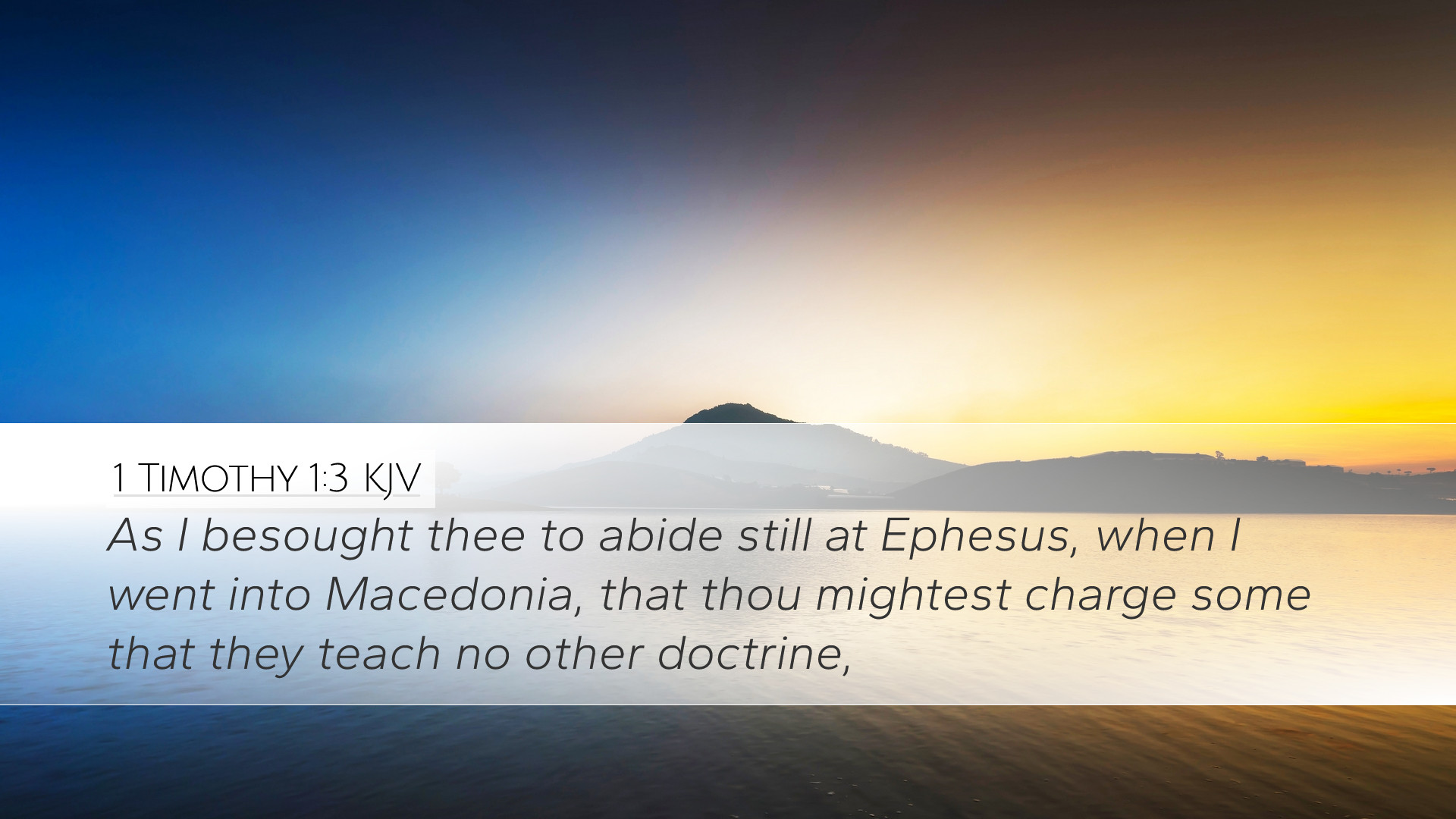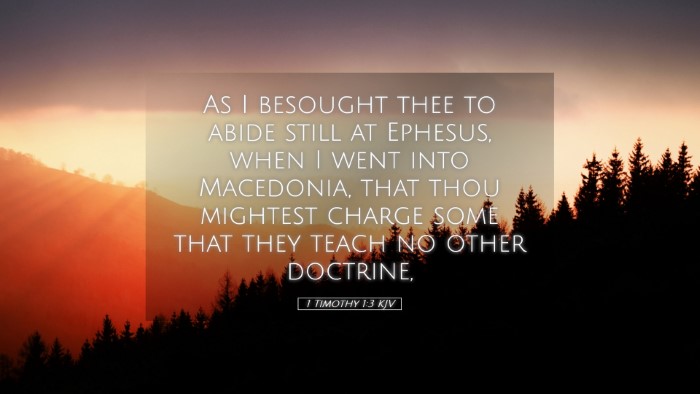Old Testament
Genesis Exodus Leviticus Numbers Deuteronomy Joshua Judges Ruth 1 Samuel 2 Samuel 1 Kings 2 Kings 1 Chronicles 2 Chronicles Ezra Nehemiah Esther Job Psalms Proverbs Ecclesiastes Song of Solomon Isaiah Jeremiah Lamentations Ezekiel Daniel Hosea Joel Amos Obadiah Jonah Micah Nahum Habakkuk Zephaniah Haggai Zechariah Malachi1 Timothy 1:3
1 Timothy 1:3 KJV
As I besought thee to abide still at Ephesus, when I went into Macedonia, that thou mightest charge some that they teach no other doctrine,
1 Timothy 1:3 Bible Commentary
Commentary on 1 Timothy 1:3
Bible Verse: "As I urged you when I went into Macedonia, remain in Ephesus that you may charge some that they teach no other doctrine."
Introduction
The Apostle Paul, in his first letter to Timothy, addresses critical issues regarding doctrine and church leadership in the early church. This particular verse sets the stage for the apostolic authority vested in Timothy as he undertakes the significant responsibility of shepherding the church at Ephesus.
Context and Background
Paul's instruction to Timothy occurs in a context of growing challenges to sound doctrine. The church at Ephesus faced the influence of false teachings that threatened the purity of the gospel. Understanding the socio-religious environment is crucial for grasping the urgency of Paul's exhortation.
- Historical Context: The city of Ephesus was a cultural and religious melting pot, renowned for the temple of Artemis and various philosophical schools.
- Apostolic Authority: Timothy's role as a young leader under Paul's mentorship indicates the need for strong, biblically grounded leadership in the face of adversity.
Exegesis of the Verse
This verse emphasizes several key themes pertinent to pastoral ministry:
- Charge and Command: The term "charge" signifies an authoritative direction, highlighting the weight of responsibility Timothy bears in upholding sound doctrine.
- No Other Doctrine: Paul's insistence on no other doctrine reflects the urgency to preserve the integrity of the gospel against heretical views that had begun to infiltrate the church.
- Macedonian Journey: The mention of Macedonia indicates Paul's broader evangelistic mission and the strategic nature of placing Timothy in Ephesus to confront false teachings.
Insights from Public Domain Commentaries
Matthew Henry
Henry emphasizes the importance of doctrinal purity, stating that Paul’s charge to Timothy to remain in Ephesus signifies the demand for vigilance and integrity in the ministry. He notes that ministers should be prepared to confront false teachings to ensure the church's spiritual well-being.
Albert Barnes
Barnes elaborates on the necessity of guarding against false teachers, asserting that there is a moral obligation for Timothy to ensure that sound doctrine is preserved. He highlights the dangers posed by unauthorized teachings and the need for a steadfast commitment to apostolic doctrine.
Adam Clarke
Clarke discusses the implications of Paul's instruction, noting that the directive to charge others not to teach different doctrines outlines the gravity of preserving the gospel. He points out that Timothy's leadership must convey the seriousness of adherence to the truth as revealed through Scripture.
Theological Implications
The exhortation found in this verse speaks volumes to contemporary pastoral responsibilities:
- Authority in Teaching: Pastors are called not merely to teach but to safeguard the doctrine of the church, echoing Paul’s dedication to truth.
- Combatting Heresy: The need for discernment is paramount as ministers navigate the complexities of modern theological challenges, drawing parallels to Timothy's context.
- Importance of Accountability: The instructional nature of the verse suggests a model of accountability among church leaders, establishing a foundation for robust ecclesiastical governance.
Application for Today
1 Timothy 1:3 holds vital lessons for modern churches:
- Commitment to Doctrine: Emphasizing the need for commitment to biblical doctrine within congregational settings to resist the influence of false teachings.
- Encouragement for Pastors: Pastors should take heart in knowing that they are called to uphold the gospel amid a myriad of distractions.
- Role of the Church: The church is called to be a beacon of truth in a world often filled with contradictory messages about faith and morality.
Conclusion
1 Timothy 1:3 serves as a crucial reminder of the responsibilities borne by church leaders to maintain doctrinal integrity. As contemporary believers, we are called to reflect upon the weight of this charge and commit ourselves to engaging with Scripture diligently, fostering communities grounded in truth.


